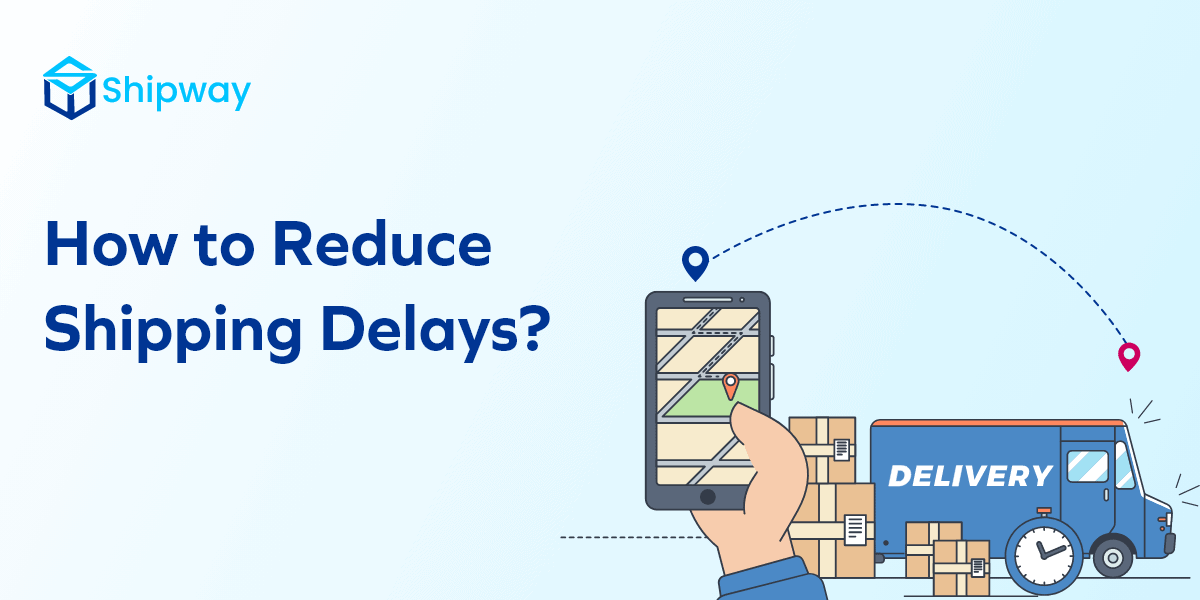Shipping delays can be a major setback. Customers expect swift deliveries, and any hiccups in the process can tarnish your brand’s reputation. In this blog, we’ll explore the common reasons behind shipping delays, delve into their impact on e-commerce brands, and provide six effective strategies to minimize these disruptions.
5 Reasons for Shipping Delays
- Inaccurate Address Information:
Incorrect or incomplete addresses lead to delivery detours, causing delays. - Carrier Issues:
Problems with the chosen carrier, like capacity constraints or logistical hiccups, can result in hold-ups. - Customs Clearance:
International shipments can get stuck in customs, leading to unexpected delays. - Weather and Natural Disasters:
Unforeseen weather events disrupt transportation, affecting delivery schedules. - High Order Volume:
Surges in demand, especially during peak seasons, can overwhelm logistics systems and cause delays.
Impact of Shipping Delays on eCommerce Brands
- Customer Dissatisfaction:
Delays erode customer trust, leading to dissatisfaction and potential churn. - Negative Reviews and Reputation Damage:
Unhappy customers are more likely to leave negative reviews, harming your brand’s online image. - Lost Sales and Revenue:
Customers may abandon purchases due to extended delivery times, resulting in revenue loss. - Operational Inefficiencies:
Delays strain inventory management, order processing, and customer service operations.
6 Strategies to Reduce Shipping Delays
1. Optimize Inventory Management

Efficient inventory management is a cornerstone of preventing shipping delays. Keep a pulse on your product demand patterns and maintain optimal stock levels. Embrace technologies like inventory forecasting software that uses historical data and predictive algorithms to anticipate demand fluctuations. This enables you to restock before inventory runs low, preventing unexpected stockouts that can delay fulfillment.
2. Invest in Real-time Tracking

The ability to track shipments in real-time is invaluable. Implement advanced tracking systems that offer real-time visibility into the movement of packages. Not only does this empower your customers to monitor their orders, but it also provides your logistics team with essential data to identify potential delays early and take corrective actions. Invest in modern tracking solutions that integrate seamlessly with your existing systems.
3. Clear Communication

Effective communication is a linchpin in managing customer expectations and minimizing dissatisfaction caused by shipping delays. Proactively update customers about their order status, estimated delivery dates, and any potential delays. Offer multiple channels for communication, such as email and SMS notifications. Transparency builds trust, and customers appreciate being informed, even if it means a slight delay in their delivery.
4. Carrier Diversification

Overreliance on a single carrier can leave your business vulnerable to carrier-specific issues. To mitigate this risk, diversify your carrier portfolio. Partner with a carrier aggregator that has integration with multiple reputable carriers that offer reliable service. Some courier aggregators offer auto allocate courier partners based on the fastest delivery to a pin code, cheapest carrier options, and best delivery providers. A diversified carrier network provides flexibility, allowing you to switch carriers if you experience delays or disruptions.
5. Automate Processes

Human errors and manual interventions can contribute to shipping delays. Embrace automation to streamline your order processing and fulfillment workflows. Implement order management systems that automate label generation, address validation, and order routing. Additionally, automate tracking updates to keep customers informed about their order’s progress. Automation minimizes errors and accelerates the entire fulfillment process.
6. Predictive Analytics

Harness the power of data analytics to anticipate demand patterns, allocate resources efficiently, and prevent bottlenecks that lead to shipping delays. Utilize historical order data, seasonality trends, and market insights to forecast demand accurately. This enables you to allocate inventory strategically and allocate resources where they are needed most during peak periods. Predictive analytics empowers you to stay proactive and prevent delays before they occur.
Final Takeaway
Shipping delays can be detrimental to e-commerce success, affecting customer satisfaction, brand reputation, and revenue streams. By addressing the root causes and implementing these strategic solutions, businesses can ensure smoother operations, timely deliveries, and enhanced customer experiences. Stay ahead of the curve, minimize delays, and watch your brand thrive in the competitive e-commerce landscape.
You may also like…
Top 10 India Delivery Company for E-commerce Businesses (2026)
Choosing the right India delivery company is crucial for eCommerce businesses looking to provide fast, reliable, and cost-effective shipping. The...
read more10 Fastest eCommerce Courier Partners in India for 2026
Finding a fast delivery service in India has become essential for every growing eCommerce brand. With customer expectations rising rapidly, online...
read moreTop 10 Logistics Companies in India for eCommerce (2026 List & Guide)
Introduction: Why Logistics Matters for India’s Growing eCommerce Sector The Indian eCommerce sector has witnessed tremendous growth, projected to...
read more




